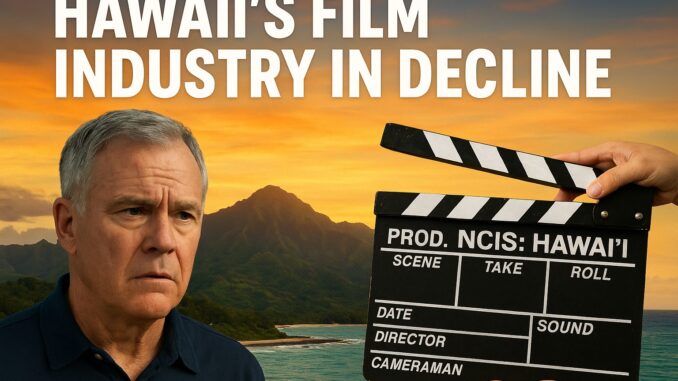
The dazzling beaches, lush mountains, and cinematic sunsets of Hawaii have long been a dream setting for filmmakers. From Jurassic Park to Lost and Hawaii Five-0, the islands have attracted global productions for decades. But after CBS pulled the plug on NCIS: Hawai’i in 2024, the state’s once-bustling TV and film industry has seen a sharp decline. A year later, the cracks are more visible than ever. In this article, we’ll explore why Hawaii’s entertainment economy is faltering, what led to the downturn, and what it means for the state’s creative community moving forward.
The Rise and Fall of NCIS: Hawai’i
When CBS launched NCIS: Hawai’i in 2021, it was more than just another spinoff. It brought steady jobs, regular filming, and millions of dollars in economic impact to Oahu. For three seasons, the show kept production crews, caterers, drivers, makeup artists, and local businesses thriving.
But in 2024, CBS canceled the series, citing ratings concerns and corporate cost-cutting. For Hawaii, the cancellation was more than just the end of a TV show—it was the loss of a financial lifeline.
Hollywood’s Love Affair with Hawaii
Hawaii isn’t new to screen stardom. The islands have been a backdrop for:
-
Blockbusters like Jurassic World and Pirates of the Caribbean.
-
Long-running TV hits like Magnum P.I., Hawaii Five-0, and Lost.
-
Commercial shoots for travel, fashion, and lifestyle brands.
For decades, productions fueled tourism and gave locals high-paying union jobs. But the industry thrives only when big shows or films commit to long-term shooting in the state.
Why NCIS: Hawai’i Was So Important
Unlike big-budget films that wrap in months, NCIS: Hawai’i filmed continuously for three years. That consistency meant:
-
Stable jobs for hundreds of crew members.
-
Local casting for background actors and recurring roles.
-
Tourism boosts as fans flocked to filming spots.
-
Revenue for small businesses supplying props, food, and logistics.
When the show ended, many of these workers were left scrambling.
The Immediate Fallout
So what happened in the year following the cancellation? Here’s the harsh reality:
-
Job losses skyrocketed. Many crew members had to either relocate to Los Angeles, Atlanta, or Canada to find work.
-
Soundstages went quiet. Production facilities in Honolulu saw fewer bookings.
-
Tourism tied to the show declined. Fan tours lost momentum without new content fueling excitement.
-
Local businesses took a hit. Vendors who supplied food, wardrobe, and equipment reported steep revenue drops.
The Broader Industry Decline
NCIS: Hawai’i wasn’t the only factor, but it was the tipping point. The industry overall is struggling due to:
1. Rising Production Costs
Hawaii is paradise, but it’s expensive. Transporting equipment, housing crew, and securing locations are pricier than shooting in mainland states with larger infrastructure.
2. Global Competition
Cities like Atlanta, Vancouver, and Albuquerque offer generous tax credits and lower costs, luring productions away.
3. Inconsistent Tax Incentives
Hawaii’s film tax credit exists but is often debated politically, creating uncertainty for long-term projects.
4. Industry Strikes & Streaming Cuts
The 2023 writers’ and actors’ strikes disrupted schedules, and many streamers have since slashed budgets.
Stories Behind the Numbers
Behind every statistic are real people. Crew members who spent years on set now drive for rideshare apps. Makeup artists once busy with daily shoots now struggle to fill their calendars. Entire families who relied on union healthcare from production jobs have had to make hard choices.
It’s not just about glitz and glamour—this is about livelihoods.
Comparisons to Hawaii Five-0
When Hawaii Five-0 ended in 2020 after ten seasons, there was an immediate slowdown. But NCIS: Hawai’i quickly filled the gap. Its cancellation, however, left no replacement. Unlike the early 2000s, no new major show stepped in to keep the momentum alive.
What Hawaii Stands to Lose
If the decline continues, Hawaii risks losing:
-
Skilled workforce. Crew members leaving for mainland jobs may not return.
-
Global visibility. The islands may fade from Hollywood’s spotlight.
-
Economic diversity. With tourism already volatile, film and TV offered another revenue stream.
Is There Hope for a Revival?
It’s not all doom and gloom. Several ideas are being floated:
1. Strengthening Tax Credits
A more competitive, consistent incentive could make Hawaii more attractive.
2. Encouraging Local Productions
Investing in Hawaii-based filmmakers can spark homegrown storytelling.
3. Attracting Streaming Projects
Netflix, Apple, and Amazon are always scouting for unique settings. Hawaii could position itself as a ready-made studio paradise.
4. Leveraging Tourism Partnerships
Film and tourism boards can collaborate to market Hawaii as both a destination and a production hub.
The Role of Community Advocacy
Industry insiders stress that Hawaii needs a unified voice. Unions, government leaders, and local businesses must rally to attract productions. Without collective lobbying, the state risks falling behind forever.
Lessons Learned from NCIS: Hawai’i’s End
The cancellation highlighted two key truths:
-
Hawaii can’t rely on a single production to keep its industry alive.
-
Long-term planning and incentives are essential for sustainability.

Looking Beyond TV and Film
Hawaii might also diversify into:
-
Digital content such as YouTube series and influencer projects.
-
Gaming and VR experiences using real Hawaiian landscapes.
-
Commercial production hubs for brands wanting cinematic backdrops.
The Emotional Impact on Locals
Beyond economics, there’s pride at stake. Shows like NCIS: Hawai’i showcased Hawaiian culture and landscapes to millions. Locals felt represented, celebrated, and connected to a global audience. Losing that spotlight hurts more than just the wallet—it hits the heart.
Final Thoughts
A year after NCIS: Hawai’i ended, the state’s film and TV industry is clearly in decline. The loss of consistent jobs, economic opportunities, and cultural visibility has left Hawaii at a crossroads. Without strategic planning, competitive incentives, and strong advocacy, the islands risk fading from Hollywood’s radar.
But Hawaii has one powerful advantage: it remains one of the most breathtaking filming locations on Earth. With the right policies and partnerships, the industry can rise again.